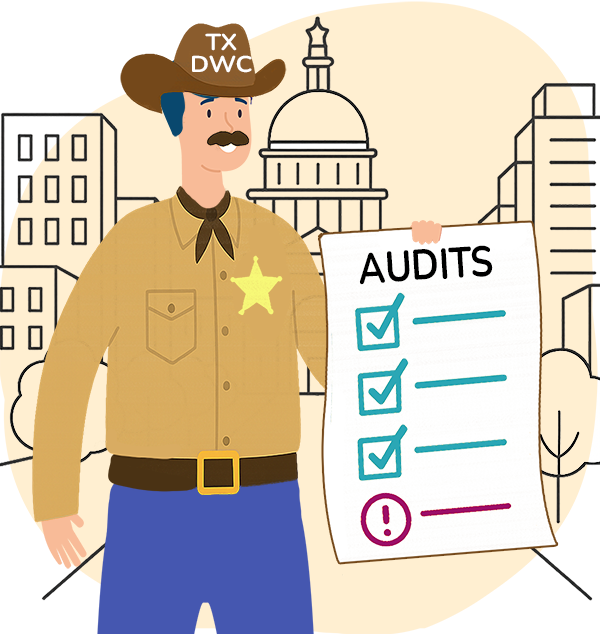TX Workers' Comp Providers: Know Your Patients' Rights

Providers who treat injured workers know it’s challenging to navigate the workers’ comp system— even in Texas, where the Division of Workers’ Compensation (TX DWC) is exceptionally helpful in ensuring access to information.
It’s worthwhile for Texas providers to be familiar with injured workers’ fundamental legal rights to help patients avoid unnecessary complications and obstacles to proper care.
Below, we outline seven rights granted to injured workers per the Texas Office of Injured Employee Counsel (OIEC). When providers and injured workers are informed, the result is better outcomes.
Right 1: Free Help From OIEC
All injured workers have the right to guidance from the OIEC, free of charge. The OIEC has physical office locations throughout Texas and can be reached by phone at 1-866-393-6432. OIEC resources are also available online at www.oiec.texas.gov.
The information and assistance the OIEC offers can be especially critical to injured workers not represented by an attorney, as explored in further detail below.
Right 2: Attorney Assistance
An injured worker may hire an attorney to help navigate the system and honor their legal rights.
Workers can find attorneys through the Texas State Bar’s referral service at 1-877-983-9227, at www.texasbar.com, or on the OIEC website. If an injured worker can’t afford an attorney, there is free help from OIEC (see Right 3).
Right 3: OIEC Ombudsman Assistance
If an injured worker needs guidance but can’t afford an attorney, the OIEC offers help from designated Customer Service Representatives and Ombudsmen.
While an ombudsman cannot offer legal advice or representation, these professionals are specially trained in workers’ compensation issues and are authorized to:
- Liaison between the worker and the insurance adjuster
- Help the injured worker schedule dispute resolution proceedings
- Help prepare the worker for the proceedings
- Attend the proceedings with the worker
- Assist the worker at a Benefit Review Conference (BRC)
- Assist the worker at a Contested Case Hearing (CCH)
- Assist the worker with appeals
Right 4: Appropriate Benefits
Per the OIEC, injured workers are entitled to medical and income benefits “regardless of who was at fault” for a work-related injury, subject to certain exceptions.
As long as care for a work-related injury is medically necessary, the injured worker has the right to that care. Additionally, subject to qualifying conditions, injured workers can be reimbursed for travel expenses related to care and examinations.
Right 5: Disputing Benefits
If the injured worker doesn’t agree with the medical or income benefits granted by the insurer, the worker can request Medical or Indemnity Dispute Resolution proceedings, which must occur within 75 miles of the worker’s home.
Right 6. Provider Choice
Depending on their employer, injured workers in Texas have varying provider choices.
-
If the injured worker is restricted to seeking care within a Workers’ Compensation Health Care Network (WCHCN), the worker may choose their provider within that WCHCN. The worker may also switch doctors within the WCHCN once without network approval.
- Workers who are not restricted to WCHCNs may choose their doctor. However, if the worker decides to switch doctors, the Texas DWC (TX DWC) must pre-approve the new doctor.
- Injured employees of “political subdivisions,” including municipal governments, county governments, and school districts, must choose their doctor according to the rules established by their employer.
Right 7. Confidentiality
While HIPAA laws do not apply to workers’ compensation, Texas does grant injured workers the right to confidentiality regarding their claims.
There are certain reasonable exceptions. The employer and insurer may access information regarding claims, as can potential employers, who may obtain “limited information” from the TX DWC regarding past workers’ comp claims.
For further details, a complete breakdown of injured workers’ rights and responsibilities is available from the OIEC here. The TX DWC website also offers a wealth of information for workers’ comp providers, complete with resources alphabetized by topic.
As a reminder, Texas providers must establish in writing whether or not each patient has a work-related injury or illness. Billing a patient or private insurer for treatment for a work-related injury may result in administrative penalties from the state.
Know your patients, know the rules, and bill accordingly.
daisyBill is always here to help with workers’ comp billing questions — reach us in the chat at the bottom right of this page or email us at info@daisybill.com.
Nationwide, daisyBill increases revenue and decreases hassle for providers who treat injured workers. Get a free demonstration below.
SCHEDULE DEMO
DaisyBill provides content as an insightful service to its readers and clients. It does not offer legal advice and cannot guarantee the accuracy or suitability of its content for a particular purpose.



